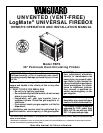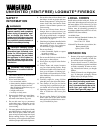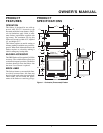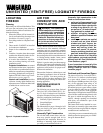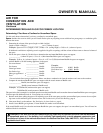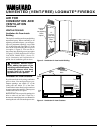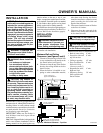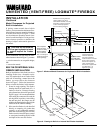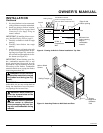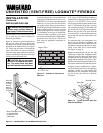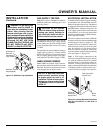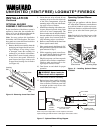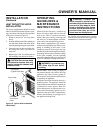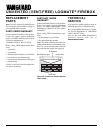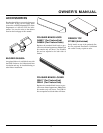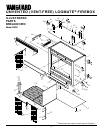
2
105163
UNVENTED (VENT-FREE) LOGMATE
®
FIREBOX
®
1. This firebox shall not be installed in a
bedroom or bathroom.
2. Never install the firebox
• in a recreational vehicle
• where curtains, furniture, clothing, or
other flammable objects are less
than 36 inches from the front, top, or
sides of the firebox
• in high traffic areas
• in windy or drafty areas
3. Do not use this firebox as a wood-burn-
ing fireplace. Use only decorative
unvented room heaters (log sets).
4. Do not add extra logs or ornaments
such as pine cones, vermiculite, or rock
wool. Using these added items can
cause sooting.
5. You must operate this fireplace with the
provided fireplace screens, hoods, and
brick liners in place. Make sure these
parts are in place and screens are closed
before running firebox. The supplied
hoods may not be replaced with hoods
which may be provided with a log heater.
SAFETY
INFORMATION
IMPORTANT: Read this owner’s
manual carefully and completely
before trying to assemble, oper-
ate, or service this firebox. Im-
proper use of this firebox can cause
serious injury or death from burns,
fire, explosion, electrical shock, or
carbon monoxide poisoning.
CAUTION: Carefully review
the instructions supplied with the
decorative type unvented room
heater for the minimum firebox
size requirement. Do not install
the appliance in this firebox un-
less this firebox meets the mini-
mum dimensions required for the
installation.
WARNINGS
WARNING: Any change to
this firebox or its controls can be
dangerous.
6. Do not allow fans to blow directly into
the firebox. Avoid any drafts that alter
burner flame patterns. Ceiling fans can
create drafts that alter burner flame
patterns. Altered burner patterns can
cause sooting.
7. Do not use a blower insert, heat ex-
changer insert or other accessory not
approved for use with this firebox. Use
only the provided hoods, or appropri-
ate polished brass hood accessories. See
Accessories on page 15.
8. Vent-free gas log heaters installed in this
firebox require fresh air ventilation to
run properly. See Air for Combustion
and Ventilation, pages 4 through 6.
9. Do not run firebox
• where flammable liquids or vapors
are used or stored
• under dusty conditions
10. Do not use this firebox to cook food or
burn paper or other objects.
11. Never place any objects in the firebox
or on logs.
12. Firebox fronts and screens becomes
very hot when running firebox. Keep
children and adults away from hot sur-
faces to avoid burns or clothing igni-
tion. Firebox will remain hot for a time
after shutdown. Allow surfaces to cool
before touching.
13. Carefully supervise young children
when they are in the room with firebox.
14. Turn firebox off and let cool before
servicing. Only a qualified service per-
son should service and repair firebox.
15. Operating vent-free logs above eleva-
tions of 4,500 feet could cause pilot
outage.
16. Do not use the firebox if it has been
under water due to the shock hazard
that could result with the blower acces-
sary (if installed) in place.
LOCAL CODES
Install and use firebox with care. Follow all
local codes. In the absence of local codes, use
the latest edition of The National Fuel Gas
Code ANS Z223.1, also known as NFPA 54*.
Firebox must be electrically grounded in
accordance with the National Electrical Code,
ANS/NFPA70 (latest edition).
*Available from:
American National Standards Institute, Inc.
1430 Broadway
New York, NY 10018
National Fire Protection Association, Inc.
Batterymarch Park
Quincy, MA 02269
UNPACKING
1. Remove all protective packaging from
inside firebox. Carefully lift the fire-
box off the bottom corrugated tray.
2. Carton should contain 3 deflective
hoods and hardware packet in addition
to firebox assembly. If items are miss-
ing, inform dealer where you bought
firebox.
3. Check all items for any shipping dam-
age. If damaged, promptly inform
dealer where you bought firebox.
NOTICE:
The firebox identifica-
tion label (including model num-
ber, serial number, clearances,
etc.) is located directly above the
brick liner and under the heat
shield. See Figure 20, page 14.



